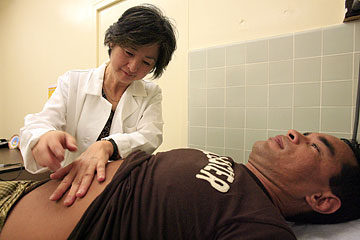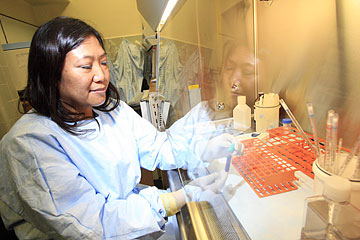Isle AIDS unit loses $2M in federal funding
On the eve of World AIDS Day, the loss of annual federal funds for Hawaii's Clinical Trials Unit will affect 100 to 150 clients a year
HAWAII'S only AIDS clinical trials program loses up to $2 million a year in federal funding effective tomorrow -- the day before World AIDS Day observances.
"It's a real devastation," said Jon Berliner, executive director of Gregory House, who was a patient in the clinical trials years ago.
"In some cases, it's almost like a last hope for treatment for people with HIV that may not be succeeding on approved medications. It's a really valuable program that's going to be a significant loss to our community and to individuals who really rely on that," Berliner said.
The unit has been operated with federal support at Leahi Hospital since 1990 by the University of Hawaii's John A. Burns School of Medicine.
But Dr. Cecilia Shikuma, program director, said she received a phone call Nov. 21 informing her the unit isn't receiving a new grant from the AIDS division of the National Institute of Allergy and Infectious Diseases.

JAMM AQUINO / JAQUINO@STARBULLETIN.COM
Dr. Cecilia Shikuma checked patient Rommel Marcelino for liver enlargement yesterday at the UH AIDS Clinical Trials Unit at Leahi Hospital.
|
|
"I never dreamed our basic program would be in jeopardy," she said, noting the irony of the shocking news just two days before Thanksgiving and "on the heels of World AIDS Day."
"They will give us funding to continue patients already on trial ... but that probably will end within the year," she said. "We have not heard what they want us to do with those patients."
Shikuma and nine other doctors and researchers sent a letter to Gov. Linda Lingle asking for assistance.
The grant "supports a research infrastructure that has contributed $23 million in funding over the past five years," they wrote. "The de-funding of our Hawaii AIDS Clinical Trials Unit will have a profound impact on the University of Hawaii, as well as on Hawaii's HIV-infected community."
State and community supporters joined the unit in appealing to Hawaii's congressional team for help to get the funding decision reversed.
Debbie Ogata-Arakaki, coordinator of the unit, which she helped to start, said more than 500 patients have been enrolled over the years. The unit generally has 100 to 150 clients per year, she said.
About 20 staff members are partially or directly funded by the grant, she said. She asked a federal program official what to tell them and said she was advised to tell them, "Just hang in there."
She said the unit is following 95 patients now. About 50 are in a study that is supposed to go to 2010 and another 20 to 30 are in a study lasting up to two years, she said.
The program "brings in top-notch, cutting-edge research" that elevates the level of HIV care in the community, Ogata-Arakaki pointed out. The unit's physicians also provide services in Kona and Hilo where there aren't enough doctors to see HIV patients, she said.
The UH unit initially was funded as one of three minority institutions in the national program, she said. The third time it competed for a grant, the federal agency eliminated minority groups and had all applicants compete as AIDS clinical trials units, Ogata-Arakaki said.
"We were successful competing with the big boys (such as Stanford and Johns Hopkins University)."
National Institutes of Health requirements for grant applications changed again this year, but the Hawaii unit was hopeful because federal officials said they were taking into account geographic distribution and international sites, Ogata-Arakaki said.
"How they can say 'geography' and not fund the only site in the middle of the Pacific is beyond us. Of all the research studies, we provide 35 percent of Pacific islanders." She said they were not given a specific reason for termination of the funding.
Shikuma said, "Considering we're the only show in town in Hawaii and bringing one-third of the entire national enrollment of Asian-Pacific Islanders into the program since it started 15 years ago, to me that's phenomenal."

JAMM AQUINO / JAQUINO@STARBULLETIN.COM
Research associate Michaelyn Etrata held a vial of blood being tested at the UH AIDS Clinical Trials Unit in Leahi Hospital yesterday afternoon. The facility will lose $2 million in annual federal funding, effective tomorrow, alarming staffers and patients alike.
|
|
Shikuma said the National Institutes of Health this year combined therapeutic clinical and vaccine trial units, pediatrics and adult units and domestic and international sites into one competition. "The idea was they could save money by funding one site to do a whole different gamut of things, and domestic as well as international sites.
She said the Hawaii unit applied to do vaccine trials, as well as therapeutic trials, and said, "We have a marvelous Bangkok site." The Thailand site has a smaller-scale trial clinic and six research projects in various stages, she said.
Loss of funding for the basic research program will have far-reaching ramifications, Shikuma said, because it has provided infrastructure for physicians to apply for other grants and conduct ancillary programs here and overseas.
Besides its satellite research facility in Bangkok, the Hawaii unit provides HIV-AIDS education activities for Southeast Asian doctors in partnership with the Department of Defense.
It also assists Vietnam with antiretroviral treatment programs through the President's Emergency Plan for AIDS Relief and trains Vietnamese military physicians at Leahi Hospital.
She doesn't know what's going to happen now but said she doesn't think the unit can maintain the related activities without the research program. And she questioned how long the program's investigators, including several in Bangkok, will stick around without the federal grant.
"It takes a very long time to gather very experienced staff and know how to do this, and really takes only a couple months to destroy the whole infrastructure," Shikuma said.

